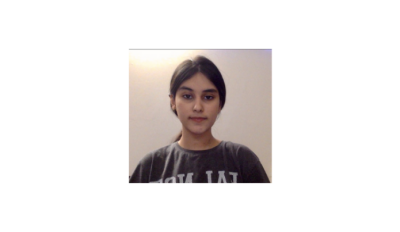
Meet Fariya Maryam from Gurgaon, Haryana, founder of Project Inclusion and Ayka – For The People. These organisations have been working through art, volunteers, and workshops to help less privileged people in areas such as education, mental health, mentrual health, etc.
How did you embark on a journey of social work?
I’ve been interested in social work from a young age and excited about starting something new. It just so happened that started pursuing my interests in Class XI, during the pandemic. It all started with Project Inclusion, which I launched to raise awareness about mental health and neurodiversity. I think it was the pressure and mental health issues affecting so many people in the pandemic that pushed me to do something about it. I decided to make this a priority and started organising weekly support groups to help people deal with their mental pressures. Then, I started connecting with people with similar interests to broaden my initiative. Expanding my interests and skills in social work led me to start Ayka – For The People, an organisation that aspires to provide skill development opportunities and access to holistic education to less privileged children. We started with painting murals in rural areas and organising nationwide donation drives for the less privileged. Furthermore, I took a lot of interest in teaching subjects such as Maths and English. The progress the students made motivated me to continue my journey.
Tell us about your non-profit organisation. What kind of impact does it hope to create?
I founded Project Inclusion in 2020 with the aim of destigmatising mental health issues. We have been raising awareness about autism and learning disorders such as dyslexia, and for the last two years been working round the clock to provide free, accessible mental health resources to all strata of society. We offer weekly workshops on anxiety, depression, and stress, and have taken up the responsibility to connect a person in dire need of help with a mental health professional for a fee. Apart from that, we’ve been educating less privileged children about mental health to deal with the pressure of examinations, bullying, etc., and less privileged women about Premenstrual Syndrome (PMS), a topic that menstrual hygiene workshops often don’t cover. So our central aim is to educate people on significantly downplayed but important topics.
How do you perceive art?
Calling art a medium of expression is an understatement. It is the means through which you get the freedom to make something of your will and show it to a large audience. It’s open to interpretation, that’s the most unique thing about art that I love. I think my art is rebellious in the sense that I have made it my aim to break stereotypes and prejudices against marginalised groups of society. I believe that art has a voice of its own and I love raising awareness through art. I understand that my art may seem provocative, but that is not my intention.
What made you start Ayka – For The People.
I started Ayka when I was 15. I was painting the walls at my grandmother’s in Jamshedpur, and our domestic help watched it in awe and wanted me to paint her house. Then, as word spread about the basic flower design I had painted, more and more people approached me to paint their walls. I started painting in several houses and then moved on to local schools wherein I created art on social and environmental issues. I also brought together a community of art students. We started painting murals and then went on to focus on improving the quality of education for less privileged children. We wanted to cultivate in students a sense of creativity. We started organising lessons on communication, art, and general knowledge. We are now around 500 people across the country, and have five branches: Delhi, Mumbai, Pune, Kolkata, and Bengaluru. So far, we’ve completed 50 wall paintings and a plethora of workshops. We are passionate about what we do. I believe when you start enjoying social work, the difference you can make is huge.
Any tips for fellow teens to keep a check on their mental health?
I’m not a professional, but I can share my experience. I think if you’re not taking care of your mental health, then you’re jeopardising your future. When I didn’t pay heed to mental health, my productivity was plummeting. But mental well-being is not all that complex. It could be as simple as going out for a walk, taking care of a plant, or practising meditation and mindfulness. These things may come off as silly for teens, but trust me, they are important.
What are your future plans?
I’m planning to pursue a degree in health sciences followed by an MBA. I want to work on developing innovative and robust solutions to deal with mental health illnesses, and I think taking up an interdisciplinary subject that explores psychology, biology, and health will certainly help me in achieving my goals.
How do you manage your time?
I am always doing something or the other. I have a habit of writing down any pending tasks and completing them one by one until I’m done with all of them. I work when I have random bursts of energy and motivation, and do not prefer a timetable-like approach.
If there is something you’d like to change in society, what would that be?
Gende stereotypes. I want to break the patriarchal social construct in India. I think discrimination would never end but improvement is certainly possible through the younger generations. All genders must fight stereotypes together for the well-being of humanity. Many people think awareness campaigns on mental health wouldn’t bring tangible results, but I think otherwise. I’ve helped many people who didn’t even know they were struggling, and I would say mental health awareness has been instrumental in their ongoing recovery.
Picture Credit : Google



